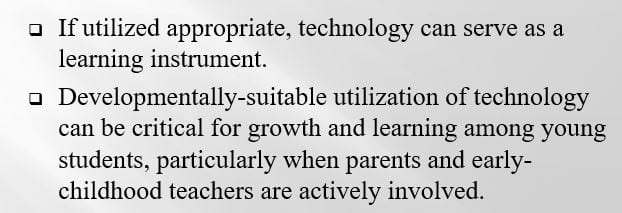Explain the positive and the negative use of technology in the early childhood classroom to develop language and literacy skills.
Integrating Technology into Literacy Instruction
Literacy is developed throughout a young student’s day. In this technological age, schools are seeing technology as a tool to engage learners, as well as provide dynamic content not readily available in books.
Create a professional development digital presentation of 12-15 slides on incorporating technology in the early childhood classroom.
Presentation must address the following:
Explain the positive and the negative use of technology in the early childhood classroom to develop language and literacy skills. Include research to support your claims.
Explain the importance of considering the learners’ needs and development when selecting instructional technology.
Describe developmentally appropriate practices to ensure the safe, legal, and ethical use of technology in the classroom.
Identify three different literacy standards and discuss ways technology can support instruction for each standard.
Describe 3-5 technological tools to support literacy instruction and how the tools could be implemented in the early childhood classroom.
Answer preview to explain the positive and the negative use of technology in the early childhood classroom to develop language and literacy skills.


